- Home
- Mick Foley
The Hardcore Diaries
The Hardcore Diaries Read online
The Hardcore Diaries
POCKET BOOKS, a division of Simon & Schuster, Inc.
1230 Avenue of the Americas, New York, NY 10020
Copyright © 2007 by World Wrestling Entertainment, Inc. All Rights Reserved.
World Wrestling Entertainment, the names of all World Wrestling Entertainment televised and live programming, talent names, images, likenesses, slogans and wrestling moves, and all World Wrestling Entertainment logos and trademarks are the exclusive property of World Wrestling Entertainment, Inc. Nothing in this book may be reproduced in any manner without the express written consent of World Wrestling Entertainment, Inc.
This book is a publication of Pocket Books, a division of Simon & Schuster, Inc., under exclusive license from World Wrestling Entertainment, Inc.
All rights reserved, including the right to reproduce this book or portions thereof in any form whatsoever. For information address Pocket Books, 1230 Avenue of the Americas, New York, NY 10020
All other photos and images Copyright © 2007 World Wrestling Entertainment, Inc. All Rights Reserved.
ISBN-13: 978-1-4165-5896-5
ISBN-10: 1-4165-5896-9
POCKET and colophon are registered trademarks of Simon & Schuster, Inc.
Visit us on the World Wide Web
http://www.simonsays.com
http://www.wwe.com
To Vince McMahon.
Thanks for the bumps
in the road.
Introduction
I originally pitched an idea for a new book to Vince McMahon back in June of 2005, after reading Buzz Bissinger’s book Three Nights in August. I had been captivated by Bissinger’s ability to allow the readers unprecedented access into the mind of St. Louis Cardinals manager Tony La Russa, and how much insight was gained from that access—a seemingly irrelevant three-game series against the Chicago Cubs (sure, it wasn’t irrelevant at the time, but would be if looked at from a historical perspective) took on such magnitude when seen through the eyes of La Russa.
I wanted to write that same type of book about WWE. I wanted to be like Buzz Bissinger, but I wanted to create a WWE equivalent to Three Nights in August —bigger, badder, undoubtedly not as well researched or well written. I wanted to write Maniac — Inside the Mind of Vince McMahon at WrestleMania.Vince seemed to like it, and tentative plans were made to publish the book in the spring of 2007.
Without the snowstorm, it’s questionable The Hardcore Diaries would even exist. A huge blizzard blanketed much of the Northeast in the second week of February in 2006, grounding thousands of flights and casting a shadow of doubt onto the probability of my appearing as scheduled on the February 13 edition of Raw —the designated time for me to kick-start my WrestleMania angle (or storyline, in non-wrestling-speak) with Edge. I really needed to make that show. And Vince McMahon made sure I got there—by giving me a seat on the WWE corporate jet.
While en route to Raw in Greensboro, North Carolina, Vince asked me about the book idea. I tried to let him down as gently as I could.
“I’m not sure I can really write a book about WrestleMania if I’m playing a major role in it.”
Vince nodded his head, empathizing with my literary lamentation. “You know, Mick,” he said, “why don’t you just forget about that idea and write another autobiography.”
Courtesy of the Foley family.
“That’s just what the world needs, Vince,” I joked, “a third volume of my memoirs.”
But Vince was not to be swayed. With much of the WWE creative team as witnesses, Vince spent several minutes singing my literary praises, doing his best to convince me that the world did indeed need another volume of Mick Foley memoirs. Hey, if Winston Churchill could put out three, why not me? Who did Churchill ever beat? I told Vince that I would start traveling with a notebook, writing down stories of the road as I thought of them.
Still, until my phone rang a couple of days later, I really felt that Vince was just being nice to me, just trying to score a few points for the inevitable day when I’d be mad about a payoff or some questionable WWE creative decision.
The phone call was from Dean Miller, the lead liaison for WWE in their publishing deal with Pocket Books, a division of Simon & Schuster. “So, I’m told you’re going to write another book for us,” Dean said.
“Yeah, I guess so,” I replied.
I didn’t actually have a clue as to what I would write about. Perhaps, I thought, I wouldn’t have to write about anything. I’d been writing a weekly Web log for WWE for about two months. Some of it was actually pretty good. At its best, it was thought-provoking stuff. At its worst, it was entertaining filler—things I wrote down an hour or so before deadline.
“Hey, Dean, would it be all right if I included some of my Web entries?” I said, thinking in fact that the book would be all Web entries.
“I don’t think that will be a problem.”
Except there was a problem—my damn conscience. Sure, a book of previously written Web entries would have been easy enough. But I’d taken so much pride in writing my first two books, Have a Nice Day and Foley Is Good , that any reasonably astute reader would correctly surmise that I’d simply phoned in the third act of this trilogy. What a letdown it would be—kind of like Porky’s III and the way it undermined the credibility of the first two Porky’s classics.
So over time, I came to accept that I would write about something else—I just didn’t know what.
Around the second week of April, a giant burst of inspiration seemed to crash right into me, leading me to believe that I had an incredible storyline for the upcoming One Night Stand Pay-Per-View event.
Unfortunately my editor at Pocket Books, Margaret Clark, called at this most inopportune time. Could I have a manuscript completed by July 4? she wanted to know. July 4? Was she crazy? How would I find the time to write when I had to imagine, visualize, concentrate, travel, wrestle, and even—oh no!—get back in the gym? And what would I even write about?
A second burst of inspiration hit. That’s it, I thought. That’s the book. Imagining, visualizing, concentrating, wrestling, even getting back in the gym. The idea would be the book. The book would be the idea. I would simply chart the course of this idea from conception to completion—an intense six-week ride that would allow our fans unprecedented access into the meetings, phone calls, backstage antics, TV tapings, and ultimately the wrestling ring, where the idea would play itself out.
I would get to be like Buzz Bissinger after all. But instead of getting inside the mind of Tony La Russa, I’d have to get inside my own.
Prepare yourself—it’s going to be a bumpy ride.
The Hardcore Diaries
April 24, 2006
Dear Hardcore Diary,
Sometimes it’s all in the pitch. When it comes to presenting creative wrestling ideas, I have come to learn that the presentation of the idea is often more important than the idea itself. I have heard terrible ideas pitched magnificently, and magnificent ideas pitched terribly, so believe me when I tell you that it’s all in the pitch.
A little less than four weeks ago, I participated in our biggest showcase of the year, WrestleMania. Many people thought I had been in the best match on a very good show. Sometimes it’s hard for WrestleMania to live up to the hype, but in this case, I think fans went away from the arena or their television sets pleasantly surprised and extremely satisfied.
Our match was one of the intangibles of the night. I felt like a major question mark was hanging over me, as if many fans, wrestlers, and WWE office personnel wondered whether I still had what it took to deliver the goods on such a major show. Hell, I wondered myself. My knees are shot, my back is bad, my neck hurts pretty much all the time, and I’ve had a history of head injuries
. To make things worse, I’m three bills and change, about 315 before a big meal, and on certain days, every step taken seems like a major challenge. Still, somehow, with the considerable help of a great opponent, Edge, I was able to pull it off.
But not once during the buildup to WrestleMania did I ever truly feel the story. I may have done a good job pretending, but deep down, I knew something was missing.
Passion. That’s what I lacked. For some reason, I just couldn’t tap into that reservoir of passion that had been one of my calling cards for so many years. A passion that allowed a not-so-good-looking guy, with a not-so-good-looking body (a bit of an understatement there), with a limited supply of athleticism, to excel in a world where good looks, athleticism, and aesthetically pleasing bodies are the rule. Or maybe there was simply nothing left to tap into. Maybe the reservoir was dry.
I currently have the dubious distinction of having the easiest contract in the WWE. I owe WWE two Pay-Per-View wrestling matches a year, and a nonwrestling appearance at one more Pay-Per-View. In addition, I am required to show up at whatever number of television tapings it takes to properly promote these appearances. So, I’m basically looking at an approximate workload of fifteen days a year. Nice, right? While I don’t feel any outward resentment from the other wrestlers, I can’t help but feel that I would be resenting a guy like me if I were in their shoes.
I mean these guys are on the road up to 300 days a year (some will dispute that figure, but including travel and promotional days, it gets pretty close), and most are in some degree of pain around the clock. Some awfully big guys travel an awfully long time in some awfully small coach-class airplane seats, and then do their best to put on an exciting show in a year-round business that spans a good portion of the globe. Then those sore, exhausted wrestlers are asked to step aside so an out-of-shape ghost of wrestling’s past can step in and take their spot on a major Pay-Per-View.
Most of the guys on the roster genuinely like me. Some even hold me in high esteem because of what I’ve accomplished in the past and how much I was willing to sacrifice in order to accomplish it. But for those who may resent me, I don’t blame them, especially because I haven’t had the decency to show up for my ridiculously light workload with a thimbleful of the passion that’s so necessary for success in today’s wrestling game.
Where had it all gone? After all, it was only two years since my Backlash match with Randy Orton, a match that ended the eight-year reign of “Mind Games” with Shawn Michaels, as my personal career favorite. I’d been overflowing with passion for that match. I had thought about it nonstop, to the point of sleeplessness, to the point of obsession, to the point where every waking moment seemed filled with wild visions of thought-provoking, gut-wrenching interviews, images of emotional and extremely physical, maybe even brutal, ring action.
My major challenge at Backlash 2004 was merely to take those images that were so vivid in my head and make them real in front of a microphone, and later in front of the live crowd in Edmonton and a Pay-Per-View audience around the world.
I met that challenge two years ago. I succeeded. In 2006, however, I just couldn’t find the passion. I lucked out at ’Mania, but doubted I’d be so lucky when my number was called again, probably in September.
What had gone wrong in those two years? Maybe I’d just simply fallen out of love with wrestling. That happens in all facets of life, doesn’t it? People simply fall out of love. But why, after all these years, had I stopped loving something that had been so good to me, something that had actually loved me back for such a long time?
Maybe it was the Ric Flair book, which had caused me to feel abandoned by WWE, due to their decision not to give me any advance warning of the literary pounding I would have to endure.
Or maybe I felt like I had taken the easy way out, by opting for the WWE contract, instead of taking a gamble with the upstart TNA promotion. My longtime buddy Raven (whose real name is Scott Levy; I actually had to ponder that for a while) had gotten in my ear and convinced me that if I were indeed to jump to TNA, it could literally make the difference between life and death for the promotion. I’ll get further into my TNA temptation later in the book, as well as explain an instance where Raven inspired a major point in my novel Tietam Brown, but for now I’ll just say that for a while, I did feel a certain amount of guilt concerning the decision I ultimately made.
That guilt is now gone. The passion that had been so sorely lacking has come rushing back. A giant lightbulb seemed to go off above my head, as one simple idea seemed to flush whatever creative and emotional block I had been suffering from right out of my system.
I know of several writers who create ideas simply by asking, “What if?” What if aliens came down from outer space? What if a shy, socially repressed girl had telekinetic powers? What if a bumbling fool who’d never accomplished anything became U.S. president? All very scary scenarios, right? The idea that rekindled the fire underneath my creative ass was just as frightening, perhaps more so. What if I became the first voluntary member of the Vince McMahon “Kiss My Ass Club”?
With that one simple, repugnant thought, my long estrangement ended. I went back to the one who loved me. As it turned out, she’d never really left; she’d been waiting all along. Once reunited, the pieces all seemed to fall together, like a giant mental puzzle that I was just dying to shake up and reconstruct, only this time not just in my mind, but in front of millions around the world.
I sat on the idea for a few days, partially to let it ripen and mature in my mind, like a fine vintage wine, and partially to figure out if I was really willing to kiss another man’s ass. I mean, literally kiss another man’s ass. Sure, I’d been kissing the same guy’s ass figuratively for a decade. But this was different. Did I really have the testicular fortitude required for such a task? On international television? In front of millions? Including my wife and kids? I checked my testicles…just as I’d hoped—full of fortitude.
I made the call.
April 27, 2006
Dear Hardcore Diary,
Vince liked it! He really liked it! Everybody did. In the past, when I’d pitched ideas, it was usually to an audience of two—Vince and someone else. Over the years, that someone else had been a variety of people: from former heads of talent relations J. J. Dillon and Jim Ross, to former head of the creative team, Bruce Prichard, to current head of talent relations, John Laurinaitis, to Raw head writer Brian Gewirtz. For this occasion, however, Vince had asked if I would mind pitching the idea to the entire creative team.
Why not? The more the merrier, right? Besides, for an idea like this, that I wholeheartedly believed in, it would be in my best interest for as many people as possible to hear it directly from me, limiting the possibility of a loss somewhere in the translation process.
WWE is always good about offering me transportation, usually a town car, from my home on Long Island, New York, to their office in Stamford, Connecticut. And I’m always good about declining it. Unless, of course, I’m doing work for them in New York City, in which case I gladly accept the ride, so as not to get frustrated with the one-way streets, massive traffic, thirty-dollar parking lots, and general insanity of the city that never sleeps.
But for the most part, I’m much happier in my used Chevy minivan, playing my own tunes as loud as I want, throwing fast-food wrappers onto ever-growing piles of their brethren, and focusing my mind on whatever task is at hand. And this task should be easy. I simply have to sell the creative team an idea that, in all honesty, should sell itself. But in the unlikely event that this idea doesn’t sell itself, I’ll be ready. Because as I mentioned earlier, sometimes it’s all in the pitch. I’ve even taken great care not to look like the casual slob I usually am. No more flannels and sweats for the hardcore legend. At least not for a few hours. No, for this meeting, I’ve got my pitcher’s uniform on: ill-fitting blue sports coat, wrinkled dress shirt, a tie I bummed off Regis Philbin at Who Wants to Be a Millionaire, black jeans, and Red Wing work boots.
I was summoned into the booking meeting and immediately seated next to Vince, who, I surmised, wanted to be the first to sample the nuggets of wisdom that were sure to spew from my mouth. Seated around the table were Dusty Rhodes, a certifiable wrestling legend and former booker in WCW; Greg Gagne, a longtime fixture in his father’s former AWA promotion, who was fairly new to the creative team; Michael Hayes, one of the great attractions in the business in the 1980s and a mainstay on the creative team for the last decade or so; Ed Koskey, the assistant writer on Raw ; Stephanie McMahon, the boss’s daughter and senior VP of creative writing; Dave Lagana, the head writer on SmackDown! ; and Brian Gewirtz, Raw head writer.
Gewirtz is about 6-4, 220, with a ripped bodybuilder’s physique. He’s well versed in several of the martial arts and could very well have been a force inside WWE rings if not for a predisposition toward…wait, I’m sorry, I must be thinking of a different guy. Actually Gewirtz is a classic nerd, albeit a very creative one. Over the years, he has somehow been hit with the unfair rap of being nothing but a pop-culture couch potato, with no background as a wrestling fan. In actuality, Gewirtz has been obsessed with this sports entertainment stuff for almost twenty years, even dressing as yours truly at a college Halloween party. Gewirtz is no simple nerd—he’s a wrestling nerd, dammit!
Vince gives me a quick introduction, and then offers me the floor, or the table in this case.
“I’d like to start out,” I say, “by letting you know that if you like this idea, you can give partial credit to Michael Hayes for doing a pretty good job of convincing me to stick around after ’Mania .”
Michael is all smiles. In some ways, it’s tough to go from being one of the business’s most flamboyant men in front of the camera, to being a driving force behind it. I can see that Michael appreciated the acknowledgment.

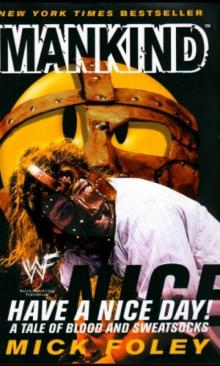 Intro
Intro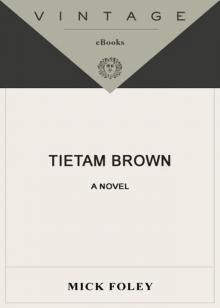 Tietam Brown
Tietam Brown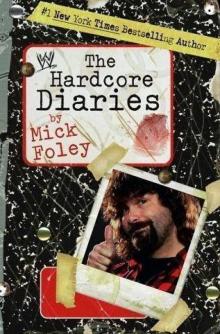 The Hardcore Diaries
The Hardcore Diaries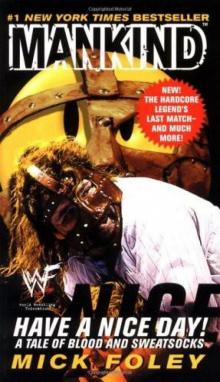 Have a Nice Day!: A Tale of Blood and Sweatsocks
Have a Nice Day!: A Tale of Blood and Sweatsocks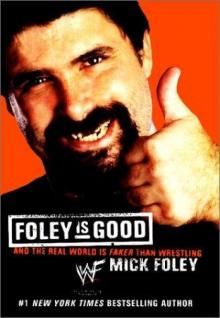 Foley Is Good: And the Real World Is Faker Than Wrestling
Foley Is Good: And the Real World Is Faker Than Wrestling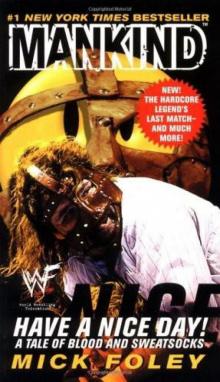 Have a Nice Day
Have a Nice Day